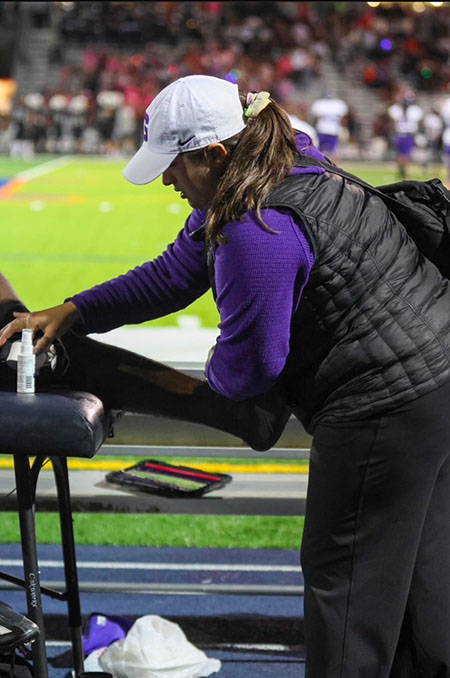Seattle Children’s Athletic Trainers Are Vital Team Members
3.25.25 I Sarah Radulovich-Go and Heather Cooper

They’re there well before the pregame warm-ups, and they’re often the last to leave the event. They come with encouraging words, loads of knowledge, helpful tips, ice packs and gauze bandages. Who are these healthcare professionals? Athletic trainers!
Athletic trainers are the unsung heroes of sports. Many parents may not know the breadth of activities that athletic trainers lead in support of young athletes. Healthy Tides sat down with Rachel Conrad, head athletic trainer at Seattle’s Garfield High School, and part of Seattle Children’s Athletic Training Program, to learn more.
Q: Tell us a little about yourself; how long have you been with Seattle Children's? How long have you been an athletic trainer?
A: I have been a Certified Athletic Trainer for eight years, with the last four years spent working at Seattle Children's. I am originally from Boston but moved to the West Coast seven years ago. Outside of work, I enjoy skiing, hiking, camping, and spending time with friends.
Q: What inspired you to pursue a career as an athletic trainer?
A: I became interested in athletic training in high school. I grew up surrounded by sports, whether I was participating in them or watching with my family. During my athletic career, I sustained a few injuries, and I was fortunate that my school had an athletic trainer. I worked closely with them after surgery, and they helped me return to the sports I loved. In my senior year, I had the opportunity to do a small internship with the athletic trainer, which allowed me to experience what a "day in the life" of an athletic trainer looked like. After that, it was an easy decision for me to pursue a degree in athletic training in college.
Q: What is your favorite aspect of being an athletic trainer?
A: The most rewarding aspect of athletic training is witnessing your athletes' success. This could be excelling in their sport, returning to play after a long rehabilitation, achieving good grades in school, or getting accepted into their top college.
Q: How do athletic trainers work with school health center staff, the school nurse, the teen’s parents, the coach, and the teen’s primary care team?
A: Providing the best care for our athletes requires teamwork and significant effort. The more support we receive from coaches, parents, school staff, and administrators, the easier it is to deliver excellent care. Building strong relationships is essential to ensuring our athletes receive comprehensive support.
Every day, I check in with parents and coaches about any injuries, collaborate with the nurse for accommodations during the school day, and refer athletes to our Teen Health Center for high-quality care. I am fortunate that Garfield's Teen Health Center is staffed and supported by Odessa Brown Children's Clinic, which facilitates easy communication between myself and the providers, as well as streamlined referrals for our athletes.
Q: Some athletes think they should only use the athletic trainer’s time when they are in pain – what do you want the athletes you cover to know about when to seek your care or guidance?
A: Many athletes may not fully understand the range of support we can provide. Athletic trainers are trained in emergency care, injury prevention, evaluation, diagnosis, and rehabilitation. We can also assist athletes by connecting them with appropriate resources and guidance for issues beyond just Sports Medicine and Orthopedics.
Q: How do athletic trainers support athlete mental wellness?
A: Athletic trainers not only support an athlete's physical well-being but also their mental wellness. Athletes often juggle academics, sports, social life, and home responsibilities, which can be overwhelming. My room serves as a safe space for athletes to express their feelings and concerns. At the beginning of each sports season, my goal is to build trust and create an environment where athletes feel comfortable coming to me with any issue, knowing they will be fully supported in a safe space. Many times, athletes just need to vent or seek advice. However, if necessary, I can connect them with additional resources and healthcare professionals to address more significant mental health needs.
Q: What’s one thing that athletes across sports commonly don’t do or don’t get enough of that you wish they would?
A: Over the past few years, I have consistently discussed nutrition with my athletes. Many high school athletes do not realize how many calories they need to support their high level of physical activity. I've observed that they often do not eat enough and fail to choose quality foods. I strive to educate them on simple nutrition facts and healthy eating habits, emphasizing how these changes can significantly enhance their athletic performance.
Q: What do you look forward to as you continue in this career?
A: As I progress in my career, I look forward to continuing to care for athletes and educating them about the importance of whole-body wellness. I also hope to raise public awareness about the vital role athletic trainers play in ensuring safety in sports at all levels.
Q: What advice would you give a young person who might be interested in going into athletic training as their career?
A: First, research all aspects of athletic training. Learn about the various responsibilities of athletic trainers, as their roles go far beyond just providing water, taping injuries and covering football games, which many people mistakenly believe encompasses most of what they do. Explore the different environments where athletic trainers can work; you might discover a specialty that interests you more than just sports. Overall, athletic training is often an overlooked and underappreciated career. However, if you are truly passionate about it, you can have a very rewarding career.
Seattle Children’s athletic trainers serve seven districts across Washington state, supporting more than 25 schools, and connecting with athletes in over 35,000 patient interactions each year. Here’s to the athletic trainers who keep athletes strong, healthy and ready to perform their best!
